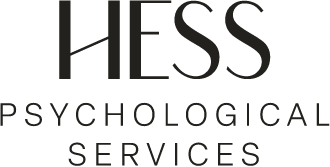Congratulations on your new baby! Pregnancy and the postpartum period can bring about profound physical, emotional, and hormonal changes, impacting new parents in many different ways. In fact, 1 in 3-5 mothers and 1 in 10 fathers experience a perinatal mental health disorder. Perinatal mental health disorders encompass a range of conditions, from the well-known postpartum depression to anxiety, obsessive-compulsive disorders, post-traumatic stress disorders, and even psychosis. At Hess Psychological Services, we recognize the significance of mental well-being while you traverse the new landscape of parenthood. Our comprehensive treatment approach integrates evidence-based therapies, personalized care plans, and a holistic support system to guide you toward emotional wellness during the perinatal period.
What are Perinatal Mood Disorders?
Perinatal mental health conditions are mental health diagnoses that occur during pregnancy or the first year after childbirth. These disorders include perinatal depression, postpartum anxiety disorders (including generalized anxiety disorder), panic disorder, obsessive-compulsive disorder, and even postpartum psychosis. Perinatal mental health disorders are more than just the common “baby blues” many women experience in the first few days following birth. One of the most common perinatal mental illnesses is perinatal depression, commonly referred to as postpartum depression, which includes feelings of sadness, guilt, lack of interest in doing anything or even taking care of your baby, and possibly thoughts of self-harm. Post-partum anxiety or obsessive-compulsive disorder may include feelings of intense worry, fear, or panic, as well as intrusive thoughts, especially related to the health and safety of the baby.
Common Causes of Perinatal Mental Health Disorders
Perinatal mental health disorders are caused by myriad factors, including a history of mental illness, complications with pregnancy, labor, or delivery, trauma, relationship issues, stress, or hormonal changes. Perinatal mental health disorders can last several weeks to even a full year and can be very serious. At their worst, perinatal anxiety disorders can lead to isolation and irritability that can affect the close relationships in your life. Postpartum psychosis is considered a medical emergency and should be treated right away in an emergency room
Signs and Symptoms of Perinatal Mood Disorders
Having a baby is a major transition with many changing thoughts and feelings. It might be easy to dismiss your emotions as normal or fleeting, but in some cases, it may be crucial to seek help. Signs and symptoms you may be suffering from a perinatal mental health disorder include:
- Feelings of sadness, depression, and weepiness.
- Decreased interest in becoming a parent or caring for your child.
- Feelings of worthlessness and guilt.
- Doubts that you will be a good parent.
- Strong anxiety, panic, and fear about the health and safety of your child.
- Sleeping less or more than usual.
- Thoughts of death and ending your life.
- Changes in appetite.
- Intrusive thoughts.
- Low energy.
- Trouble focusing, remembering things, or making decisions.
- Physical symptoms like headaches, chest pains, heart palpitations, numbness, or hyperventilation.
Modalities of Treatment
Perinatal mental health disorders are an incredibly personal form of mental illness. It is important to know that you are not alone, you are not to blame, and with treatment, you can get well. At Hess Psychological Services, we take an evidence-based, holistic, and highly personalized approach to treating conditions like perinatal depression and postpartum anxiety. Using modalities like Cognitive Behavioral Therapy and Positive Psychology, we can empower parents entering into parenthood, no matter the place in their journey.
Self-Help Tips for Perinatal Mood and Anxiety Disorders
While professional treatment is typically needed to address perinatal mental health conditions, there are some self-help steps you can take to manage your mental health. Building a solid support system, getting enough sleep, exercising regularly, eating a healthy diet, and seeking out therapy or support groups are just a few ways you can alleviate some of your symptoms.
Schedule a Consultation
If you are struggling with feelings of sadness, worry, or fear during or after your pregnancy, it is time to get the help you deserve. At Hess Psychological Services, we are dedicated to helping our clients restore confidence and contentment to their lives. To schedule a consultation with founder Dr. Heather Hess or one of her team members, please fill out an online contact form.
Frequently Asked Questions about Perinatal Mental Health Disorders
What are perinatal mental health disorders?
Perinatal mental health disorders refer to a range of mental health conditions that can affect women and men during pregnancy and the postpartum period. These include depression, anxiety, obsessive-compulsive disorder, and postpartum psychosis.
What are the signs of perinatal depression?
Signs of perinatal depression include persistent sadness, loss of interest in activities, changes in sleep and appetite, feelings of guilt or worthlessness, intrusive thoughts, and difficulty bonding with the baby.
How common are perinatal mental health disorders?
Perinatal mental health disorders are relatively common, affecting approximately 1 in 4/5 women during pregnancy or after childbirth and 1/10 men.
What are the risk factors for developing perinatal mental health disorders?
Risk factors include a history of mental health disorders, stressful life events, lack of support, complications during pregnancy or childbirth, and hormonal changes.
What treatments are available for perinatal mental health disorders?
Treatments include psychotherapy, medications (carefully chosen to be safe during pregnancy and breastfeeding), and support groups. Early intervention and support from healthcare providers are crucial.
How soon after giving birth can I start perinatal mental health treatment at Hess Psychology?
At Hess Psychology, we offer support for perinatal mental health disorders at any stage - from pregnancy through the first year postpartum. We recommend seeking help as soon as you notice symptoms, as early intervention can lead to better outcomes for both parent and baby.
Does Hess Psychology offer support for partners of those experiencing perinatal mood disorders?
Yes, Hess Psychology provides support for partners of individuals experiencing perinatal mood disorders. We offer individual therapy, couples counseling, and family therapy to help partners understand, cope with, and support their loved ones through this challenging time.
How does Hess Psychology address the unique challenges of perinatal anxiety?
Hess Psychology recognizes that perinatal anxiety often presents differently than general anxiety. Our therapists are trained to address specific concerns such as intrusive thoughts about harm coming to the baby, excessive worry about parenting abilities, and physical symptoms of anxiety that may be mistaken for postpartum health issues.
Can Hess Psychology help with perinatal OCD symptoms?
Yes, Hess Psychology has experience treating perinatal OCD, which often involves intrusive thoughts about harming the baby. We use evidence-based techniques such as Exposure and Response Prevention (ERP) therapy, tailored to the unique needs of new parents, to help manage these distressing symptoms.
How does Hess Psychology support the transition back to work for those experiencing perinatal mood disorders?
Hess Psychology offers targeted support for the transition back to work after parental leave. We help clients develop strategies for managing work-related stress, balancing new parental responsibilities, and addressing any anxiety or depression symptoms that may impact work performance.
What perinatal mental health disorders does Hess Psychology treat?
Hess Psychology treats a range of perinatal mental health disorders, including postpartum depression, anxiety, OCD, and PTSD related to childbirth experiences.
When should I seek help for perinatal mental health concerns?
If youre experiencing persistent feelings of sadness, rage, anxiety, or intrusive thoughts that interfere with daily functioning or bonding with your baby, its important to seek help promptly.
Does Hess Psychology offer support for partners of those experiencing perinatal mental health issues?
Yes, Hess Psychology recognizes the importance of partner support and offers counseling services to help partners cope and provide effective support.
Can I start therapy for perinatal mental health concerns during pregnancy?
Absolutely. Hess Psychology encourages early intervention and offers support throughout pregnancy to help manage symptoms and prepare for postpartum adjustment.
How does Hess Psychology tailor treatment for perinatal mental health disorders?
Treatment at Hess Psychology is personalized, considering factors such as hormonal changes, sleep deprivation, and the unique challenges of new parenthood in developing effective coping strategies.
TELEHEALTH
We extend our support beyond physical boundaries, offering confidential and convenient online sessions.
Learn More
Hess Psychological Services was founded during COVID when I witnessed an explosion of individuals needing help dealing with the stressors of life. We have since expanded and have a brick-and-mortar location in Comstock Park, Michigan. Our team of therapists is growing and I am honored to work alongside other clinicians with a similar passion for helping others.



